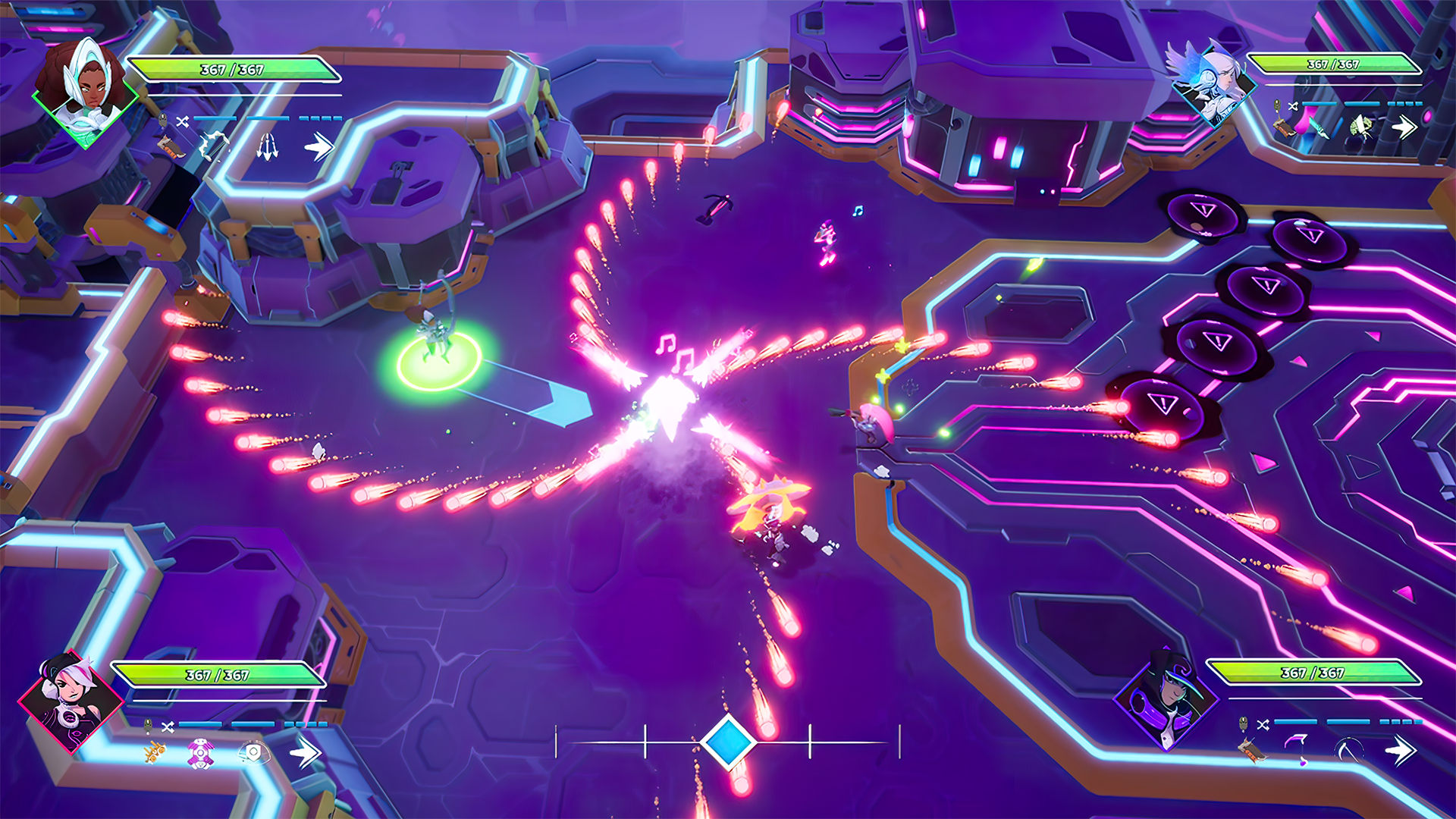More and more developers are turning to music to put a fun twist on action gameplay, from Crypt of the NecroDancer (and its Zelda follow-up Cadence of Hyrule), to FPS Bullets per Minute and platformer No Straight Roads. These aren’t games about making music, but saving the world to the beat. That’s your task in Soundfall. Taking its cue from NecroDancer, a metronome pulses at the bottom of the screen and it’s your job to shoot-shoot-dodge-repeat your way through each level sticking to the tempo. Shoot or dodge off the beat and the action will fail. Most action games have a sort of internalised rhythm, but in Soundfall it’s explicit. Hypnotic, even - your ears as hyper focused as your eyes, determined to maintain a combo. Later levels become something of a bullet hell - or rhythm hell, I should say - and I found myself nodding my head and tapping my feet as I played, dancing in my seat while my eyes refused to blink. Eventually I was tapping through the menus in rhythm too. The beat is infectious and so is the soundtrack, comprising music from real world artists. Each area of the world is a different genre: the dream-pop Skylands, the heavy metal Hotlands, the classical Forest, and more. Each comes with its own challenge too. The less percussive classical tracks, for instance, have a less discernable beat, while heavy metal tracks have a tendency to switch time signatures to keep you on your toes. And while faster tracks may seem more intense, slower tracks are actually trickier - fewer beats means fewer opportunities to attack. Tying it all together is a skippable story involving a young wannabe musician (named Melody, of course) transported to the world of Symphonia to defeat the Discordians. Everything in Soundfall is musical: the instrumental weapons, the character and world names, the underused elemental system. If the script’s musical puns grate, it’s at least all presented with charm and clarity. Animated scenes provide some welcome flair. Yet where the core hook is sound, the theme lacks variation. Sonically Soundfall is a whirlwind tour of genres and mixes, but its gameplay soon becomes repetitive. Shoot-shoot-dodge-repeat. Levels are labyrinths of repeated battle arenas and environmental art, with few obstacles or puzzle elements to challenge you. Bullet sponge enemies lack variety and never force a change in strategy. The lack of climactic end-of-level boss fights means there’s no rise and fall. There are multiple characters to play as too, with unique artefacts and overdrive moves. Yet they collectively share experience and weapons, so play too similarly to each other. There’s little instrumental colour between them. Disappointingly, then, Soundfall’s gameplay is one note. Difficulty rises through the number of enemies, but rarely in musical complexity. Soon that constant beat feels rigid and restrictive. There’s no room for improvisation or syncopation. The colourful worlds and brilliant soundtrack mask an all too simple dance. Boredom sets in. Perhaps Soundfall’s biggest misstep is a lack of creativity. Isn’t that what music is all about? There’s no impact to your actions, no musical effects. Miss a beat and you miss your shot, but the music continues regardless. For a game all about music, there remains a disconnect between soundtrack and gameplay. Perhaps that’s why Soundfall ultimately rings hollow and dissatisfying. There’s one saving grace, for PC players at least: Soundfall allows you to import your own music and will procedurally generate a level around it. It’s one way the game allows you to inject your own personality, even if it’s just a new song accompanying the same assets, the same enemies, the same shoot-shoot-dodge-repeat. Soundfall plays like an extended pop album, each level a three minute burst of music that initially fizzes and delights. Yet playing on repeat proves shallow. The music is killer, but the gameplay is filler.
